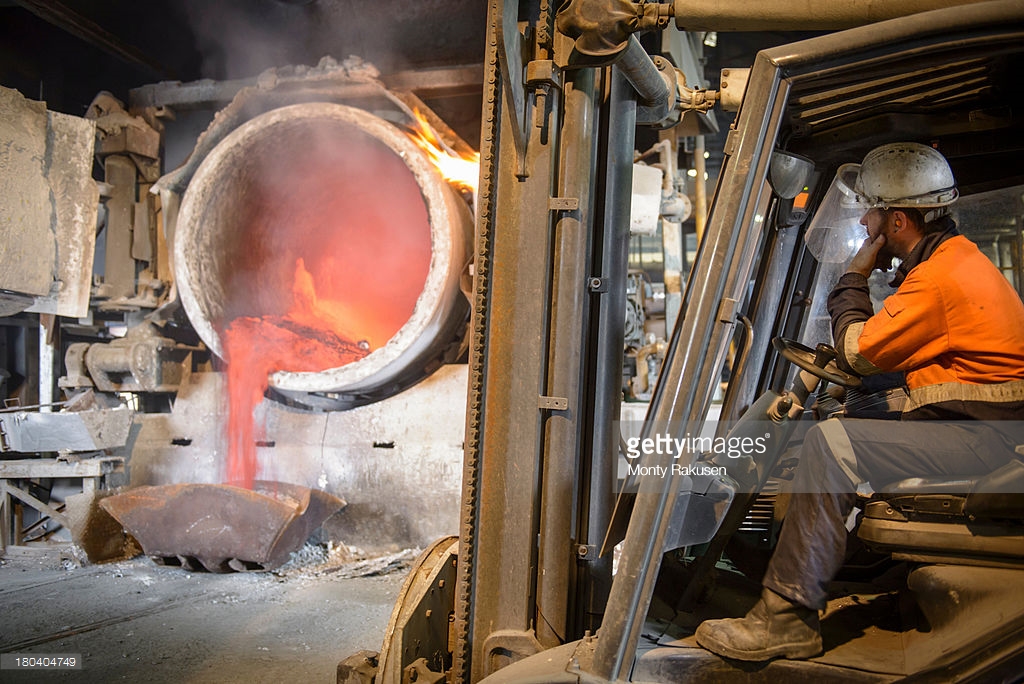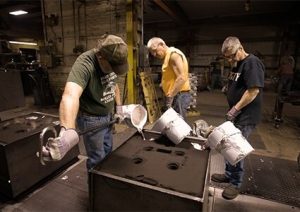Why Wisconsin Aluminum Foundry Excels in Quality, Innovation, and Reliability
A Comprehensive Guide to the Perks of Making Use Of Aluminum From Foundries
Aluminum from foundries offers a series of benefits that make it a useful product throughout various markets. Its light-weight nature adds to set you back financial savings in transport and improves overall product performance. In addition, aluminum's exceptional resistance to rust assurances longevity and decreases maintenance requirements. Nevertheless, the benefits prolong beyond these aspects (Aluminum Foundry). Understanding the complete range of aluminum's buildings and their ramifications can disclose also much deeper insights right into its role in modern applications
Understanding Foundry-Grade Aluminum
Foundry-grade aluminum is a specialized material renowned for its remarkable buildings and adaptability in numerous applications. This kind of aluminum is generally generated through regulated spreading processes, enabling exact control over its make-up and microstructure. Because of this, foundry-grade aluminum displays remarkable mechanical properties, consisting of outstanding strength and deterioration resistance, making it appropriate for demanding settings.
Along with its architectural stability, foundry-grade aluminum can be easily formed into complicated forms, giving designers and engineers with flexibility in their tasks. Its capacity to hold up against heats better improves its charm for industries such as automotive and aerospace, where efficiency and integrity are crucial. Moreover, foundry-grade aluminum is typically recyclable, adding to sustainability efforts. By using this product, producers can achieve a balance of efficiency, durability, and ecological responsibility, making foundry-grade aluminum a recommended option for a wide variety of industrial applications.
Lightweight Properties and Their Advantages
The lightweight buildings of aluminum from foundries use substantial advantages in numerous applications. Lowered transportation costs can be attained as a result of the lower weight, permitting for more efficient logistics. Furthermore, the improved product efficiency originated from making use of lighter products can result in boosted functionality and user experience.
Decreased Transportation Expenses
Aluminum's light-weight residential properties substantially add to lowered transport costs, making it an appealing selection for various industries. When compared to larger materials such as steel, aluminum permits lighter lots, enabling vehicles to deliver more items effectively. This reduction in weight can cause considerable financial savings on gas intake, as lighter lorries require less energy to run. In addition, the ability to deliver larger quantities without exceeding weight restrictions enhances logistical performance. Industries such as auto and aerospace benefit specifically from these benefits, as they can optimize shipping processes and decrease total functional expenses. Subsequently, using aluminum from foundries not only improves transportation but likewise sustains lasting techniques by reducing carbon emissions linked with hefty freight transport.
Boosted Item Performance

Deterioration Resistance: A Trick Advantage
Aluminum from foundries offers outstanding rust resistance, mainly because of its natural oxide layer. This safety covering types when aluminum is subjected to air, protecting against further oxidation and degeneration. As an outcome, items made from aluminum can exhibit resilient toughness, making them optimal for various applications in challenging atmospheres.
All-natural Oxide Layer
The natural oxide layer that bases on aluminum surfaces works as an important protection against deterioration. This slim, clear obstacle establishes when aluminum is revealed to oxygen, efficiently shielding the underlying steel from different ecological elements. The oxide layer is both steady and durable, guaranteeing that aluminum maintains its honesty in time. Unlike other metals that might rust more rapidly, aluminum's oxide layer protects against the formation of corrosion and other destructive compounds. This characteristic is specifically helpful in industries where products are subjected to moisture or rough chemicals. The existence of the natural oxide layer adds significantly to the long life and dependability of aluminum items, making it a favored selection in many applications.
Lasting Toughness
While numerous materials catch the devastations of time and ecological direct exposure, the resilient toughness of aluminum sticks out, primarily because of its remarkable rust resistance. This resistance is associated to an all-natural oxide layer that develops on its surface area, efficiently shielding the metal from dampness, chemicals, and various other harsh representatives. Unlike steel, which can rust and break down in time, aluminum stays intact, making it perfect for numerous applications, consisting of building and construction, automotive, and aquatic industries. Its light-weight nature, incorporated with resilience, permits for lowered maintenance costs and longer lifespans in products. Subsequently, aluminum from foundries provides a sustainable choice that reduces replacement frequency, adding to both economic performance and environmental responsibility. This strength improves its charm in numerous applications.
The Recyclability of Aluminum
Given its extensive usage across various industries, the recyclability of aluminum offers a significant ecological benefit. Aluminum get more info can be recycled indefinitely without losing its residential or commercial properties, making it a prime candidate for lasting methods. The reusing process needs only a portion of the power needed to produce new aluminum from basic materials, minimizing greenhouse gas emissions and saving natural sources. Additionally, the recycling of aluminum diverts waste from garbage dumps, contributing to more effective waste administration systems.

Cost-Effectiveness in Various Applications
Numerous markets identify aluminum's cost-effectiveness, making it a preferred option for numerous applications. Its light-weight nature minimizes transportation prices and power usage, significantly adding to overall cost savings. In production, aluminum's malleability permits effective shaping and developing, minimizing waste throughout manufacturing.
Moreover, aluminum's durability warranties longevity, which lowers the demand for frequent substitutes and upkeep. The product's rust resistance likewise translates into reduced long-term expenses, as it requires much less protective layer and care contrasted to other steels.

Sustainability and Ecological Impact
Aluminum's cost-effectiveness is complemented by its sustainability and positive ecological influence. The steel is highly recyclable, with around 75% of all aluminum produced still in operation today. This recyclability considerably reduces the need for basic material extraction, lessening power usage and connected greenhouse gas discharges. Foundries play a crucial function in the reusing procedure, using innovative modern technologies to repurpose scrap aluminum successfully.
Aluminum manufacturing from recycled material takes in only around 5% of the energy required for primary aluminum manufacturing. This considerable energy savings equates to decrease carbon footprints, lining up with global sustainability goals. Additionally, aluminum's light-weight nature enhances gas performance in transport applications, even more adding to minimized discharges throughout its lifecycle. As markets increasingly prioritize sustainable techniques, aluminum from foundries becomes a favorable choice, promoting ecological stewardship while sustaining economic growth.
Frequently Asked Questions
What Are the Common Applications of Foundry-Grade Aluminum?
Common applications of foundry-grade aluminum include vehicle parts, aerospace components, equipment, construction materials, and durable goods. Its light-weight nature, rust resistance, and superb mechanical homes make it ideal for diverse markets and producing processes.
Just How Is Foundry-Grade Aluminum Produced?
Foundry-grade aluminum is produced through melting aluminum scrap or ingots, followed by alloying with various other metals. The liquified aluminum is then cast into mold and mildews, permitting it to strengthen into different forms for varied applications.
What Are the Safety Factors To Consider When Working With Aluminum?
Safety and security factors to consider when collaborating with aluminum consist of appropriate air flow to stay clear of inhaling dirt, use of individual safety devices to avoid skin get in touch with, and understanding of fire hazards associated with liquified aluminum throughout handling and casting.
How Does Foundry-Grade Aluminum Compare to Various Other Metals?
Foundry-grade aluminum uses a premium strength-to-weight proportion contrasted to several metals, alongside exceptional corrosion resistance and thermal conductivity. Its adaptability and ability to be easily shaped make it a favored selection in numerous applications.
What Maintenance Is Required for Aluminum Products?
Aluminum products call for minimal upkeep, largely involving regular cleansing to avoid oxidation and dust buildup (Metal Castings). Protective layers may boost durability, while periodic assessments can ensure architectural honesty and deal with any type of wear or damages quickly
Foundry-grade aluminum is a customized product renowned for its outstanding residential or commercial properties and versatility in various applications. Leveraging lightweight homes, aluminum enhances product performance throughout numerous applications. Unlike steel, which can corrosion and break down over time, aluminum stays intact, making it suitable for various applications, consisting of construction, automotive, and aquatic sectors. Aluminum manufacturing from recycled material eats only around 5% of the energy required for main aluminum production. Foundry-grade aluminum is generated via melting aluminum scrap or ingots, adhered to by alloying with various other metals.